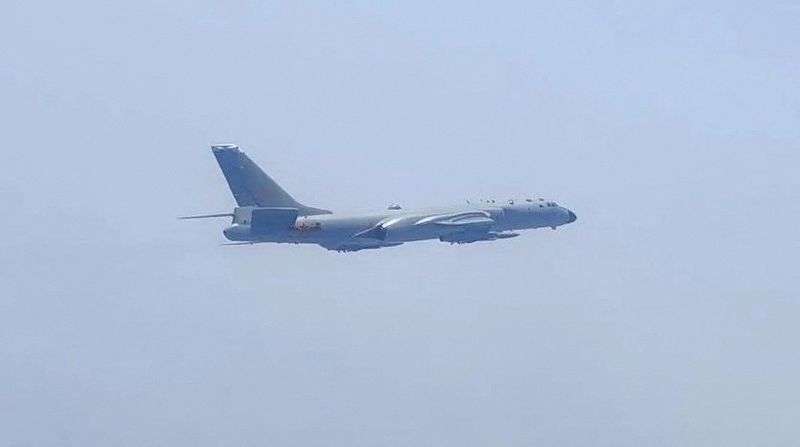China practices blockades on last scheduled day of Taiwan drills
2/2

© Reuters. An aircraft of the Air Force under the Eastern Theatre Command of China’s People’s Liberation Army (PLA) takes part in a combat readiness patrol and “Joint Sword” exercises around Taiwan, at an undisclosed location in this handout image released on April
2/2
By Ben Blanchard and Yimou Lee
TAIPEI (Reuters) -China’s military carried out aerial and naval blockade drills around Taiwan on Monday, its last scheduled day of exercises, with a Chinese aircraft carrier joining in combat patrols as Taipei reported another surge of warplanes near the island.
China announced the three days of drills on Saturday, after Taiwan’s President Tsai Ing-wen returned to Taipei following a meeting in Los Angeles with U.S. House of Representatives Speaker Kevin McCarthy.
China views democratically governed Taiwan as its own territory and has never renounced the use of force to bring the island under Beijing’s control. Taiwan’s government strongly disputes China’s claims and has denounced the drills.
Chinese state television said aircraft, including nuclear-capable H-6 bombers armed with live missiles, and warships staged drills to “form a multi-directional island-encompassing blockade situation”.
“In the Taiwan Strait, the northwest and southwest of Taiwan and the waters east of Taiwan (Chinese forces) took the initiative to attack, giving full play to their performance advantages, flexibly manoeuvring to seize favourable positions, and advancing at high speed to deter opponents,” the report said.
The Eastern Theatre Command of the People’s Liberation Army said aircraft carrier the Shandong also took part in combat patrols, and showed fighters taking off from its deck.
Taiwan has been tracking the Shandong since last week in the Pacific Ocean.
Taiwan’s defence ministry published a map on Monday of the previous 24 hours of Chinese air force activities, showing four carrier-based Chinese J-15 fighters operating over the Pacific Ocean to Taiwan’s east.
The ministry said that as of mid-morning on Monday it had spotted 59 military aircraft and 11 ships around Taiwan, and that the Shandong carrier group was conducting drills in the Western Pacific.
The Shandong conducted air operations in waters close to Japan’s Okinawan islands on Sunday, Japan’s defence ministry said on Monday.
Jet fighters and helicopters took off and landed on the carrier 120 times over Friday to Sunday, with the carrier, three other warships and a support vessel coming within 230 kilometres (143 miles) of Japan’s Miyako island, the defence ministry said.
Japan has been following China’s military drills around Taiwan “with great interest”, a top government spokesperson said on Monday.
Japan has long worried about China’s military activities in the area given how close southern Japanese islands are to Taiwan.
“The importance of peace and stability in the Taiwan Strait is not only important for the security of Japan, but also for the stability of the international community as a whole,” Chief Cabinet Secretary Hirokazu Matsuno told reporters.
The southern Japanese island of Okinawa hosts a major U.S. air force base, and last August when China staged war games to protest the visit of then-U.S. House Speaker Nancy Pelosi to Taipei, Chinese missiles landed within Japan’s exclusive economic zone.
The United States has said it is also watching China’s drills closely.
‘LOCK ON THE TARGET’
China’s military simulated precision strikes against Taiwan in the second day of drills around the island on Sunday.
The Eastern Theatre Command on Monday released a short video on its WeChat account showing an H-6 bomber flying in what it said was the skies north of Taiwan.
“The missiles are in good condition,” an unidentified voice says, as the video shows images from the cockpit.
“Start the fire control radar, lock on the target,” another voice says, showing images of a missile under the aircraft’s wing.
It then shows a pilot readying the fire control button for what it describes as a simulated attack, and then pressing the button, though it did not show any missiles being fired.
Taiwan’s military has repeatedly said it will respond calmly to China’s drills and not provoke conflict.
The defence ministry separately released pictures on Monday of mobile launchers for the Taiwan-made Hsiung Feng anti-ship missiles at an undisclosed location, as well as missile-armed fast attack boats at sea.
Reuters reporters at the Cape Maobitou park in Pingtung county on Taiwan’s southern tip saw Hsiung Feng launchers deployed near a scenic spot on Monday, as soldiers stood guard and tourists watched and posed for pictures.
Life in Taiwan has continued normally with no signs of panic or disruption, and civilian flights operating as usual.
“Most normal people probably aren’t afraid, with the main reason being that everyone thinks that China will certainly not start a war,” said retiree and former soldier Tang Pao-hsiung, 78.
Taiwan’s stock market brushed off the tension, with the benchmark index closing up 0.3% on Monday.
However, China’s blue-chip CSI300 Index fell 0.5%, while the Shanghai Composite Index dipped 0.4% as the drills curbed investors’ risk appetite.